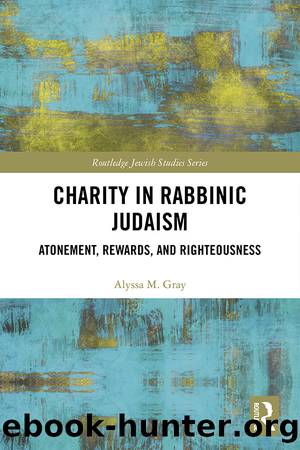Charity in Rabbinic Judaism: Atonement, Rewards, and Righteousness by Alyssa M. Gray

Author:Alyssa M. Gray [Gray, Alyssa M.]
Language: eng
Format: epub
ISBN: 9780367728649
Google: lz37zQEACAAJ
Goodreads: 55834910
Publisher: Routledge
Published: 2020-12-18T00:00:00+00:00
Charity and rescue from death or grant of longer life
Like Palestinian amoraic literature, the Bavli advances the notion that charity results in the donorâs rescue from death and longer life in this world. This message comes through clearly in a narrative found only in the Bavli about a communal tzedaqah collector/distributor named âBenjamin the tzaddiq,â who uses his own resources to provide for a widow and her seven children in a time of drought when the communal tzedaqah pouch was empty (B. Baba Batra 11a). Benjamin subsequently falls mortally ill; after the ministering angels plead on his behalf, God grants him twenty-two more years of life. The narrative does not rely on the verse tzedaqah saves from death (as one might expect), likely for reasons we will explain later.
In three other places the Bavli subtly reworks sources that ostensibly teach or imply that charity atones for sin in order to emphasize instead that charity leads to rescue from death, longer life. Recall R. Yishmaelâs teaching in the Mekhilta:
Come and see the mercy of the One Who spoke and the world came into being on flesh and blood. For a human being can acquire himself by money from the hands of heaven, as it says, (Exodus 30:12) When you take a census of the Israelite people according to their enrollment, each shall pay the Lord a ransom (kofer) for himself.62
As discussed in Chapter 3 this is straightforward redemptive almsgiving: oneâs paying the ransom to God results in oneâs acquisition of oneself. In the Bavliâs re-presentation of this source, R. Yishmael (son of R. Yohanan ben Beroqah) is said to teach that those liable on earth for a death penalty at the hands of heaven may atone and evade that heavenly death penalty through the giving of money. Unlike the Mekhiltaâs R. Yishmael, the Bavliâs R. Yishmael relies on Exodus 21:30 (If ransom [kofer] is laid upon him, he must pay whatever is laid upon him to redeem his life).63 The Bavliâs R. Yishmael clarifies the Mekhiltaâs ambiguity about what âacquiring himselfâ means: in the Bavli the âgiving of moneyâ atones for those âliable for a death penalty at the hand of heaven.â The benefit earned by the paying of the âransomâ is thus clearly stated to be the rescue from death and consequent longer life on this earth.
B. Megillah 28a illustrates a similar transformation. R. Nehunya ben HaQanahâs students ask him by what virtues he merited his long life; among his merits he points out his being a âvatran bâmamonoâ (âgenerous with his moneyâ) like the biblical Job.64 Later in the same passage R. Aqiva asks the same question of R. Nehunya the Great, who includes âvatran bâmamonoâ among his own virtues, along with his willingness not to seek retribution against anyone who wronged him. The Bavli narrator then makes a chronological and geographical leap and quotes a statement by Rava in support of the merit of not seeking retribution. Rava teaches that the sins of one who does not seek
Download
This site does not store any files on its server. We only index and link to content provided by other sites. Please contact the content providers to delete copyright contents if any and email us, we'll remove relevant links or contents immediately.
| Haggadah | Hasidism |
| History | Holidays |
| Jewish Life | Kabbalah & Mysticism |
| Law | Movements |
| Prayerbooks | Sacred Writings |
| Sermons | Theology |
| Women & Judaism |
The Power of Habit by Charles Duhigg(3121)
Man's Search for Meaning by Viktor E. Frankl(2665)
Mckeown, Greg - Essentialism: The Disciplined Pursuit of Less by Mckeown Greg(2414)
MOSES THE EGYPTIAN by Jan Assmann(2411)
Devil, The by Almond Philip C(2324)
The Complete Dead Sea Scrolls in English (7th Edition) (Penguin Classics) by Geza Vermes(2269)
Unbound by Arlene Stein(2267)
I Capture the Castle by Dodie Smith(2033)
Schindler's Ark by Thomas Keneally(1876)
The Invisible Wall by Harry Bernstein(1799)
The Gnostic Gospel of St. Thomas by Tau Malachi(1781)
The Bible Doesn't Say That by Dr. Joel M. Hoffman(1676)
The Secret Doctrine of the Kabbalah by Leonora Leet(1601)
Political Theology by Carl Schmitt(1576)
The Jewish State by Theodor Herzl(1527)
A History of the Jews by Max I. Dimont(1520)
The Dead Sea Scrolls Bible by Martin G. Abegg(1502)
The Book of Separation by Tova Mirvis(1481)
Oy!: The Ultimate Book of Jewish Jokes by David Minkoff(1361)
